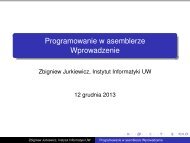- Page 1 and 2: Portugal
- Page 3 and 4: Portugal 21st Edition by Darwin Por
- Page 5 and 6: CONTENTS LIST OF MAPS vii 1 THE BES
- Page 7 and 8: 9 ESTREMADURA 208 1 Obidos. . . . .
- Page 9 and 10: LIST OF MAPS Best Portugal Itinerar
- Page 11: FROMMER’S STAR RATINGS, ICONS & A
- Page 14 and 15: 2 THE BEST OF PORTUGAL 1 FROMMER’
- Page 16 and 17: 4 THE BEST OF PORTUGAL 1 THE BEST B
- Page 18 and 19: 6 THE BEST OF PORTUGAL 1 THE BEST H
- Page 20 and 21: 8 THE BEST OF PORTUGAL 1 THE BEST P
- Page 22 and 23: 10 THE BEST OF PORTUGAL 1 THE BEST
- Page 24 and 25: 12 THE BEST OF PORTUGAL 1 THE BEST
- Page 28 and 29: 16 PORTUGAL IN DEPTH 2 LOOKING BACK
- Page 30 and 31: 18 PORTUGAL IN DEPTH 2 LOOKING BACK
- Page 32 and 33: 20 PORTUGAL IN DEPTH 2 LOOKING BACK
- Page 34 and 35: 22 PORTUGAL IN DEPTH 2 PORTUGAL’S
- Page 36 and 37: 24 PORTUGAL IN DEPTH 2 THE LAY OF T
- Page 38 and 39: 26 PORTUGAL IN DEPTH 2 PORTUGAL IN
- Page 40 and 41: 28 PORTUGAL IN DEPTH 2 EATING & DRI
- Page 42 and 43: 30 PORTUGAL IN DEPTH 2 EATING & DRI
- Page 44 and 45: 32 PORTUGAL CALENDAR OF EVENTS PLAN
- Page 46 and 47: 34 ENTRY REQUIREMENTS & CUSTOMS PLA
- Page 48 and 49: 36 GETTING THERE & GETTING AROUND P
- Page 50 and 51: 38 GETTING THERE & GETTING AROUND P
- Page 52 and 53: 40 GETTING THERE & GETTING AROUND P
- Page 54 and 55: 42 GETTING THERE & GETTING AROUND P
- Page 56 and 57: 44 GETTING THERE & GETTING AROUND P
- Page 58 and 59: 46 MONEY & COSTS PLANNING YOUR TRIP
- Page 60 and 61: 48 HEALTH PLANNING YOUR TRIP TO POR
- Page 62 and 63: 50 SPECIALIZED TRAVEL RESOURCES PLA
- Page 64 and 65: 52 SPECIALIZED TRAVEL RESOURCES PLA
- Page 66 and 67: 54 SUSTAINABLE TOURISM PLANNING YOU
- Page 68 and 69: 56 THE ACTIVE VACATION PLANNER PLAN
- Page 70 and 71: 58 ESCORTED GENERAL-INTEREST TOURS
- Page 72 and 73: 60 STAYING CONNECTED PLANNING YOUR
- Page 74 and 75: 62 TIPS ON ACCOMMODATIONS PLANNING
- Page 76 and 77:
64 TIPS ON ACCOMMODATIONS PLANNING
- Page 78 and 79:
66 most crowded and glamorous in th
- Page 80 and 81:
68 SUGGESTED PORTUGAL ITINERARIES 4
- Page 82 and 83:
70 SUGGESTED PORTUGAL ITINERARIES 4
- Page 84 and 85:
72 SUGGESTED PORTUGAL ITINERARIES 4
- Page 86 and 87:
74 SUGGESTED PORTUGAL ITINERARIES 4
- Page 88 and 89:
76 SUGGESTED PORTUGAL ITINERARIES 4
- Page 90 and 91:
78 SUGGESTED PORTUGAL ITINERARIES 4
- Page 92 and 93:
80 covered the streets and squares,
- Page 94 and 95:
82 SETTLING INTO LISBON 5 ESSENTIAL
- Page 96 and 97:
84 SETTLING INTO LISBON 5 NEIGHBORH
- Page 98 and 99:
86 SETTLING INTO LISBON 5 GETTING A
- Page 100 and 101:
88 SETTLING INTO LISBON 5 FAST FACT
- Page 102 and 103:
90 SETTLING INTO LISBON 5 WHERE TO
- Page 104 and 105:
92 SETTLING INTO LISBON 5 WHERE TO
- Page 106 and 107:
94 SETTLING INTO LISBON 5 WHERE TO
- Page 108 and 109:
96 SETTLING INTO LISBON 5 WHERE TO
- Page 110 and 111:
98 SETTLING INTO LISBON 5 WHERE TO
- Page 112 and 113:
100 SETTLING INTO LISBON 5 WHERE TO
- Page 114 and 115:
102 SETTLING INTO LISBON 5 WHERE TO
- Page 116 and 117:
104 SETTLING INTO LISBON 5 WHERE TO
- Page 118 and 119:
106 SETTLING INTO LISBON 5 WHERE TO
- Page 120 and 121:
108 SETTLING INTO LISBON 5 WHERE TO
- Page 122 and 123:
110 SETTLING INTO LISBON 5 WHERE TO
- Page 124 and 125:
112 SETTLING INTO LISBON 5 WHERE TO
- Page 126 and 127:
114 SETTLING INTO LISBON 5 WHERE TO
- Page 128 and 129:
116 SETTLING INTO LISBON 5 WHERE TO
- Page 130 and 131:
118 SETTLING INTO LISBON 5 WHERE TO
- Page 132 and 133:
120 SETTLING INTO LISBON 5 WHERE TO
- Page 134 and 135:
6 Exploring Lisbon Many visitors us
- Page 136 and 137:
124 EXPLORING LISBON 6 THE TOP ATTR
- Page 138 and 139:
126 EXPLORING LISBON 6 THE TOP ATTR
- Page 140 and 141:
128 EXPLORING LISBON 6 THE TOP ATTR
- Page 142 and 143:
130 EXPLORING LISBON 6 THE TOP ATTR
- Page 144 and 145:
132 EXPLORING LISBON 6 MORE ATTRACT
- Page 146 and 147:
134 EXPLORING LISBON 6 MORE ATTRACT
- Page 148 and 149:
136 EXPLORING LISBON 6 MORE ATTRACT
- Page 150 and 151:
138 EXPLORING LISBON 6 WALKING TOUR
- Page 152 and 153:
140 EXPLORING LISBON 6 WALKING TOUR
- Page 154 and 155:
142 EXPLORING LISBON 6 WALKING TOUR
- Page 156 and 157:
144 EXPLORING LISBON 6 OUTDOOR & RE
- Page 158 and 159:
146 EXPLORING LISBON 6 LISBON SHOPP
- Page 160 and 161:
148 EXPLORING LISBON 6 LISBON SHOPP
- Page 162 and 163:
150 EXPLORING LISBON 6 LISBON SHOPP
- Page 164 and 165:
152 EXPLORING LISBON 6 LISBON AFTER
- Page 166 and 167:
154 EXPLORING LISBON 6 LISBON AFTER
- Page 168 and 169:
156 EXPLORING LISBON 6 LISBON AFTER
- Page 170 and 171:
158 EXPLORING LISBON 6 LISBON AFTER
- Page 172 and 173:
7 Estoril, Cascais & Sintra Lured b
- Page 174 and 175:
162 ESTORIL, CASCAIS & SINTRA 7 EST
- Page 176 and 177:
164 ESTORIL, CASCAIS & SINTRA 7 EST
- Page 178 and 179:
166 ESTORIL, CASCAIS & SINTRA 7 CAS
- Page 180 and 181:
168 ESTORIL, CASCAIS & SINTRA 7 CAS
- Page 182 and 183:
170 ESTORIL, CASCAIS & SINTRA 7 CAS
- Page 184 and 185:
172 ESTORIL, CASCAIS & SINTRA 7 CAS
- Page 186 and 187:
174 ESTORIL, CASCAIS & SINTRA 7 CAS
- Page 188 and 189:
176 ESTORIL, CASCAIS & SINTRA 7 GUI
- Page 190 and 191:
178 ESTORIL, CASCAIS & SINTRA 7 GUI
- Page 192 and 193:
180 ESTORIL, CASCAIS & SINTRA 7 SIN
- Page 194 and 195:
182 ESTORIL, CASCAIS & SINTRA 7 SIN
- Page 196 and 197:
184 ESTORIL, CASCAIS & SINTRA 7 SIN
- Page 198 and 199:
186 ESTORIL, CASCAIS & SINTRA 7 SIN
- Page 200 and 201:
188 ESTORIL, CASCAIS & SINTRA 7 SIN
- Page 202 and 203:
190 ESTORIL, CASCAIS & SINTRA 7 SIN
- Page 204 and 205:
192 ESTORIL, CASCAIS & SINTRA 7 ERI
- Page 206 and 207:
8 South of the Tagus Historically c
- Page 208 and 209:
196 SOUTH OF THE TAGUS 8 AZEITAO ES
- Page 210 and 211:
198 SOUTH OF THE TAGUS 8 SESIMBRA T
- Page 212 and 213:
200 SOUTH OF THE TAGUS 8 PORTINHO D
- Page 214 and 215:
202 SOUTH OF THE TAGUS 8 SETUBAL ou
- Page 216 and 217:
204 SOUTH OF THE TAGUS 8 SETUBAL ar
- Page 218 and 219:
206 SOUTH OF THE TAGUS 8 PALMELA sp
- Page 220 and 221:
9 Estremadura is a land of contrast
- Page 222 and 223:
210 ESTREMADURA 9 OBIDOS Visitor In
- Page 224 and 225:
212 ESTREMADURA 9 OBIDOS The Beache
- Page 226 and 227:
214 ESTREMADURA 9 OBIDOS A Side Tri
- Page 228 and 229:
216 ESTREMADURA 9 ALCOBACA Off the
- Page 230 and 231:
218 ESTREMADURA 9 NAZARE Rua Franci
- Page 232 and 233:
220 ESTREMADURA 9 NAZARE comes to h
- Page 234 and 235:
222 ESTREMADURA 9 BATALHA Visitor I
- Page 236 and 237:
224 ESTREMADURA 9 FATIMA day arrive
- Page 238 and 239:
226 ESTREMADURA 9 FATIMA Rua João
- Page 240 and 241:
228 The sea is the source of life,
- Page 242 and 243:
230 THE ALGARVE 10 SAGRES: “THE E
- Page 244 and 245:
232 THE ALGARVE 10 LAGOS Costa do O
- Page 246 and 247:
234 THE ALGARVE 10 LAGOS SHOPPING A
- Page 248 and 249:
236 THE ALGARVE 10 PORTIMAO Estrada
- Page 250 and 251:
238 THE ALGARVE 10 PORTIMAO EXPLORI
- Page 252 and 253:
240 THE ALGARVE 10 PORTIMAO Here yo
- Page 254 and 255:
242 THE ALGARVE 10 PORTIMAO Rates i
- Page 256 and 257:
244 THE ALGARVE 10 PORTIMAO Monchiq
- Page 258 and 259:
246 THE ALGARVE 10 SILVES garden wi
- Page 260 and 261:
248 THE ALGARVE 10 ALBUFEIRA GOLF M
- Page 262 and 263:
250 THE ALGARVE 10 ALBUFEIRA Mooris
- Page 264 and 265:
252 THE ALGARVE 10 ALBUFEIRA atmosp
- Page 266 and 267:
254 THE ALGARVE 10 QUARTEIRA HAVING
- Page 268 and 269:
256 THE ALGARVE 10 QUARTEIRA for 20
- Page 270 and 271:
258 THE ALGARVE 10 ALMANCIL of Faro
- Page 272 and 273:
260 THE ALGARVE 10 ALMANCIL WHERE T
- Page 274 and 275:
262 THE ALGARVE 10 FARO 8 FARO 258k
- Page 276 and 277:
264 THE ALGARVE 10 FARO open onto t
- Page 278 and 279:
266 THE ALGARVE 10 FARO SÃO BRÁS
- Page 280 and 281:
268 THE ALGARVE 10 VILA REAL DE SAN
- Page 282 and 283:
270 THE ALGARVE 10 VILA REAL DE SAN
- Page 284 and 285:
272 ALENTEJO & RIBATEJO 11 TOMAR 1
- Page 286 and 287:
274 ALENTEJO & RIBATEJO 11 TOMAR Th
- Page 288 and 289:
276 ALENTEJO & RIBATEJO 11 TOMAR Tr
- Page 290 and 291:
278 ALENTEJO & RIBATEJO 11 ESTREMOZ
- Page 292 and 293:
280 ALENTEJO & RIBATEJO 11 ELVAS WH
- Page 294 and 295:
282 ALENTEJO & RIBATEJO 11 EVORA Av
- Page 296 and 297:
284 ALENTEJO & RIBATEJO 11 EVORA Ig
- Page 298 and 299:
286 ALENTEJO & RIBATEJO 11 EVORA co
- Page 300 and 301:
288 ALENTEJO & RIBATEJO 11 BEJA ESS
- Page 302 and 303:
290 ALENTEJO & RIBATEJO 11 VILA NOV
- Page 304 and 305:
12 Coimbra & the Beiras Encompassin
- Page 306 and 307:
294 COIMBRA & THE BEIRAS 12 LEIRIA
- Page 308 and 309:
296 COIMBRA & THE BEIRAS 12 FIGUEIR
- Page 310 and 311:
298 COIMBRA & THE BEIRAS 12 COIMBRA
- Page 312 and 313:
300 COIMBRA & THE BEIRAS 12 COIMBRA
- Page 314 and 315:
302 COIMBRA & THE BEIRAS 12 COIMBRA
- Page 316 and 317:
304 COIMBRA & THE BEIRAS 12 COIMBRA
- Page 318 and 319:
306 COIMBRA & THE BEIRAS 12 COIMBRA
- Page 320 and 321:
308 COIMBRA & THE BEIRAS 12 BUCACO
- Page 322 and 323:
310 COIMBRA & THE BEIRAS 12 CURIA R
- Page 324 and 325:
312 COIMBRA & THE BEIRAS 12 AVEIRO
- Page 326 and 327:
314 COIMBRA & THE BEIRAS 12 AVEIRO
- Page 328 and 329:
316 COIMBRA & THE BEIRAS 12 CARAMUL
- Page 330 and 331:
318 COIMBRA & THE BEIRAS 12 VISEU V
- Page 332 and 333:
320 COIMBRA & THE BEIRAS 12 VISEU R
- Page 334 and 335:
322 The city perches on a rocky gor
- Page 336 and 337:
324 PORTO & ENVIRONS 13 PORTO Tuy-V
- Page 338 and 339:
326 PORTO & ENVIRONS 13 FAST FACTS:
- Page 340 and 341:
328 PORTO & ENVIRONS 13 PORTO Rua D
- Page 342 and 343:
330 PORTO & ENVIRONS 13 PORTO Ramos
- Page 344 and 345:
332 PORTO & ENVIRONS 13 WALKING TOU
- Page 346 and 347:
334 PORTO & ENVIRONS 13 WALKING TOU
- Page 348 and 349:
336 PORTO & ENVIRONS 13 PORTO Thoug
- Page 350 and 351:
338 PORTO & ENVIRONS 13 PORTO parki
- Page 352 and 353:
340 PORTO & ENVIRONS 13 PORTO Rua J
- Page 354 and 355:
342 PORTO & ENVIRONS 13 PORTO cream
- Page 356 and 357:
344 PORTO & ENVIRONS 13 PORTO lobst
- Page 358 and 359:
346 PORTO & ENVIRONS 13 ESPINHO Man
- Page 360 and 361:
348 PORTO & ENVIRONS 13 ESPINHO REL
- Page 362 and 363:
350 PORTO & ENVIRONS 13 VILA DO CON
- Page 364 and 365:
352 PORTO & ENVIRONS 13 OFIR & FAO
- Page 366 and 367:
354 where grapes from vineyards on
- Page 368 and 369:
356 THE MINHO REGION & TRÁS-OS-MON
- Page 370 and 371:
358 THE MINHO REGION & TRÁS-OS-MON
- Page 372 and 373:
360 THE MINHO REGION & TRÁS-OS-MON
- Page 374 and 375:
362 THE MINHO REGION & TRÁS-OS-MON
- Page 376 and 377:
364 THE MINHO REGION & TRÁS-OS-MON
- Page 378 and 379:
366 THE MINHO REGION & TRÁS-OS-MON
- Page 380 and 381:
368 THE MINHO REGION & TRÁS-OS-MON
- Page 382 and 383:
370 THE MINHO REGION & TRÁS-OS-MON
- Page 384 and 385:
372 THE MINHO REGION & TRÁS-OS-MON
- Page 386 and 387:
374 THE MINHO REGION & TRÁS-OS-MON
- Page 388 and 389:
376 THE MINHO REGION & TRÁS-OS-MON
- Page 390 and 391:
378 THE MINHO REGION & TRÁS-OS-MON
- Page 392 and 393:
380 Porto Santo has beaches and has
- Page 394 and 395:
382 MADEIRA ESSENTIALS MADEIRA & PO
- Page 396 and 397:
384 GETTING AROUND MADEIRA MADEIRA
- Page 398 and 399:
386 FAST FACTS: MADEIRA MADEIRA & P
- Page 400 and 401:
388 WHERE TO STAY IN FUNCHAL MADEIR
- Page 402 and 403:
390 WHERE TO STAY IN FUNCHAL MADEIR
- Page 404 and 405:
392 WHERE TO STAY IN FUNCHAL MADEIR
- Page 406 and 407:
394 WHERE TO STAY IN FUNCHAL MADEIR
- Page 408 and 409:
396 WHERE TO DINE IN FUNCHAL MADEIR
- Page 410 and 411:
398 EXPLORING MADEIRA MADEIRA & POR
- Page 412 and 413:
400 EXPLORING MADEIRA MADEIRA & POR
- Page 414 and 415:
402 EXPLORING MADEIRA MADEIRA & POR
- Page 416 and 417:
404 SHOPPING IN MADEIRA MADEIRA & P
- Page 418 and 419:
406 MADEIRA AFTER DARK MADEIRA & PO
- Page 420 and 421:
408 PORTO SANTO MADEIRA & PORTO SAN
- Page 422 and 423:
410 PORTO SANTO MADEIRA & PORTO SAN
- Page 424 and 425:
412 PORTO SANTO MADEIRA & PORTO SAN
- Page 426 and 427:
16 Fast Facts, Toll-Free Numbers &
- Page 428 and 429:
416 FAST FACTS: PORTUGAL FAST FACTS
- Page 430 and 431:
418 FAST FACTS: PORTUGAL FAST FACTS
- Page 432 and 433:
420 AIRLINE, HOTEL & CAR RENTAL WEB
- Page 434 and 435:
422 Bar Procópio (Lisbon), 158 Bar
- Page 436 and 437:
424 Edgar Duarte Abreu (Braga), 361
- Page 438 and 439:
426 Madalena, Igreja de (Lisbon), 1
- Page 440 and 441:
428 Ponte de Lima, 370 Praça dos R
- Page 442 and 443:
430 Terreiro de Sé (Porto), 333 Te
- Page 444 and 445:
432 Hotel Miraparque (Lisbon), 98 H
- Page 446 and 447:
434 Cervejaria Brilhante (Lisbon),
- Page 448 and 449:
NOTES
- Page 450 and 451:
NOTES
- Page 452:
Nightlife choices in Lisbon range f





